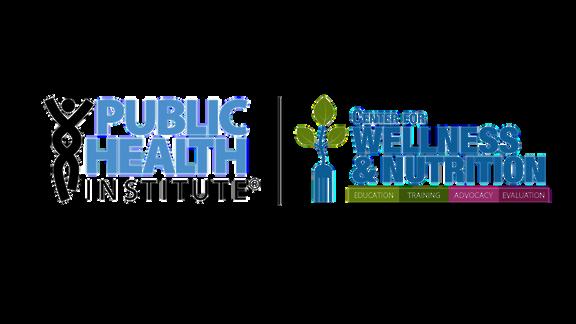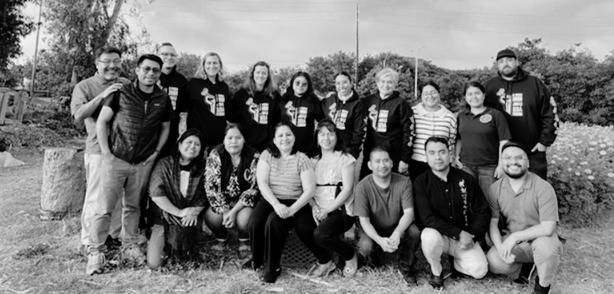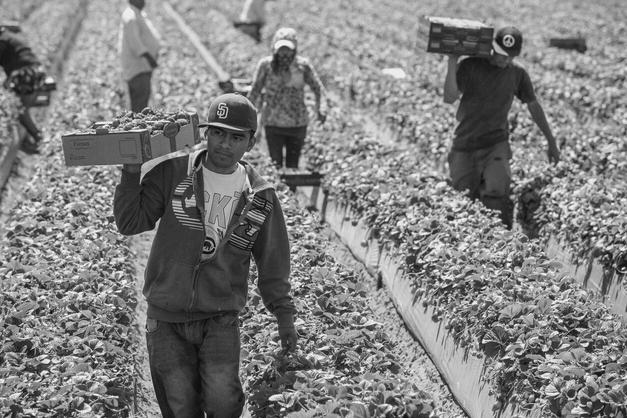

CENTER FOR WELLNESS AND NUTRITION
ANNUAL IMPACT REPORT 2024



CENTER FOR WELLNESS AND NUTRITION
ANNUAL IMPACT REPORT 2024
The Public Health Institute’ s Center for Wellness and Nutrition (PHI CWN) is a leader in developing campaigns, programs, and partnerships to promote wellness and equitable health practices in the most vulnerable communities across the world. We have established relationships with local, state, national, and international organizations, and through education, training and technical assistance, advocacy, and evaluation, we work to make health accessible for all.

CENTER FOR WELLNESS AND NUTRITION
ANNUAL IMPACT REPORT 2024
Our strategic pillars guide our efforts to promote community wellness and equity These pillars form the foundation of our services, ensuring purposeful outcomes and fostering healthier, more equitable communities.
We deliver high-quality health education centered on integrity, creativity, personalized wellness strategies, and respect for health educators. Our initiatives are designed to boost health literacy among diverse populations, ensuring equitable access to trustworthy health information
We deliver tailored training and technical assistance with a focus on strengthening individual and organizational capacity, using engaging community-centered learning strategies and providing a comprehensive range of professional development and continuing education options
We focus on promoting health through supportive policies, advancing equity via advocacy and education, and empowering communities to advocate for equitable policies, systems, and environments
We focus on building evidence and insight through original research and evaluations, guiding community-centered participatory approaches, demonstrating methodological ingenuity, and translating findings into actionable intelligence in service to equity and community.
CENTER FOR WELLNESS AND NUTRITION ANNUAL IMPACT REPORT 2024
M
PHI CWN works and collaborates across the world on some of the most pressing issues in public health Our staff leverages their expertise in nutrition education, community engagement, research and evaluation, and program development to promote health equity and reduce health disparities. By amplifying leadership, dismantling structural barriers, and addressing the social detriments of health inequity, PHI CWN is working towards a future where all individuals have access to good health.
CENTER FOR WELLNESS AND NUTRITION
ANNUAL IMPACT REPORT 2024
The following highlights showcase the breadth and impact of PHI CWN’ s work in 2024 reflecting our commitment to equity, innovation, and community partnership.
Partnered with
155 Community-Based Organizations to reach vulnerable populations
Reached
1,626
individuals through 39 training events
6,463
individuals directly and 4,235 individuals indirectly Reached Reached
1,545
individuals at 12 conferences
Partnered with
15 unique, affinity, and professional workgroups
CENTER FOR WELLNESS AND NUTRITION
ANNUAL IMPACT REPORT 2024
To improve childhood and adolescent
nutrition screening and monitoring in rural
Kenya, the Public Health Institute’ s Center for Wellness and Nutrition (PHI CWN), in partnership with the Siaya County
Government Department of Health and
Sanitation, launched a nutrition training program This initiative aims to strengthen the primary healthcare system by improving nutrition and nutrition-related services at both the facility and household levels. The program equips healthcare professionals and community health agents with the knowledge to assess the nutritional needs of children, evaluate their nutritional status using Mid Upper Arm Circumference (MUAC)
z-score tape, and make referrals to appropriate healthcare facilities
Healthcare professionals were trained in the use of the new and innovative MUAC z-score tape, enabling them to screen children, interpret results, engage with caregivers in discussions, and follow referral protocols for malnourished children to ensure continued care In addition, the Siaya County healthcare system was provided with a donation of over 5,000 MUAC z-score tapes by the Abbott Center for Malnutrition Solutions
Since the program ’ s launch in January 2024, 50 Community Health Promoters have screened over 16,000 children using the MUAC z-score tape and referred more than 146 children to health facilities for malnutrition treatment

By integrating MUAC z-score data into the Child Health and Nutrition Information System, the program ’ s effectiveness will be assessed to evaluate its impact on improving nutrition risk assessment and treatment PHI CWN is eager to develop a standardized nutrition training program and expand it to other counties, contingent on the demonstrated success and impact of the program in Siaya County
“Since implementing our screening, identification, referral, and follow-up processes for children with malnutrition under five years old, we have observed a significant increase in treatment numbers, with our cure rate now exceeding 90%”
– Oscar Kambone, Siaya County Nutrition and Health Policy Coordinator
CENTER FOR WELLNESS AND NUTRITION
ANNUAL IMPACT REPORT 2024
Rooted in the knowledge, strength, and leadership of Indigenous communities, Solidarity Beyond Borders is a Robert Wood Johnson Foundation-funded initiative focused on co-creating healthier, more resilient futures for Mixtec and Zapotec families in Oaxaca, Mexico, and California In partnership with the Mixteco Indigenous Community Organizing Project (MICOP) in Oxnard and Puente a la Salud Comunitaria –Solidaridad Internacional Kanda (PuenteSiKanda) in Oaxaca, PHI CWN is supporting locally led solutions that honor cultural identity, strengthen health and food systems, and foster cross-regional collaboration
Through participatory, qualitative research with community members in both locations the project identified three shared priorities food security, access to health services, and the advancement of women ’ s agency
These findings illuminated both the urgent needs and the deep resilience within each community.
In response, partners co-designed immersive, multi-day exchanges in Oaxaca and California These gatherings grounded in lived experience and community wisdom offered space to share concerns, highlight local innovations, and learn from one another Each exchange was rich with generosity, pride, and determination, reinforcing the power of communities to lead meaningful change.
What’s Next?
The energy and ideas sparked by these exchanges laid the groundwork for future collaboration. Participants expressed strong interest in continuing to share culturally grounded, climate-conscious practices like sustainable gardening, traditional recipes, solidarity savings groups, and strategies to improve language-appropriate access to health services

PHI CWN, Puente-SiKanda, and MICOP remain committed to building on this momentum and deepening their partnership to support the well-being and selfdetermination of Mixtec and Zapotec communities across borders
CENTER FOR WELLNESS AND NUTRITION
ANNUAL IMPACT REPORT 2024
From June to July 2024, PHI CWN conducted an independent evaluation of the Achieving Resilient Communities (ARC) project, a five-year initiative designed to strengthen community resilience in regions across California Led by PHI programs Tracking California, Roots of Change, and the Public Health Alliance of Southern
California the ARC project emphasized strategic partnerships with communitybased organizations to promote long-term systems change
To assess the project’ s impact, PHI CWN conducted key informant interviews with ARC staff and partners The findings were analyzed using thematic content analysis guided by the "One Community at a Time" framework for community resilience (Ma, Qirui & Lv, 2023) These results, along with tailored recommendations, were shared with the ARC leadership team for further reflection and planning
Despite facing challenges throughout its implementation, ARC achieved meaningful
progress in supporting community-led resilience efforts.
The initiative fostered strong collaborations with local organizations and residents through structured feedback loops In
Ventura County, it supported the formation of a farmworker committee that helped shape project goals and guided advocacy efforts Notably, ARC partners worked with regional coalitions to integrate indigenous language audio alerts Mixtec and Zapotec into wildfire emergency systems, expanding communication access for vulnerable communities
The project also played a key role in advocating for safer working conditions for farmworkers, addressing issues such as access to cool drinking water, protections for workers in hoop houses, and better mechanisms for reporting workplace violations
What’s Next?
In addition, ARC produced a powerful video series on the impacts of extreme heat, wildfire smoke, and flooding on farmworker communities This series has become a vital advocacy tool to elevate farmworker rights and climate resilience.

Overall, ARC made notable strides in advancing resilience through policy, advocacy, and deep community engagement The results of the evaluation will inform future strategies and help secure funding to continue building equitable and resilient communities across California
CENTER FOR WELLNESS AND NUTRITION
ANNUAL IMPACT REPORT 2024
Farmers Market Initiative
Training and Technical Assistance
Since 2018, the Farmers Market Initiative (FMI), locally known as Get More at the Farmers Market, has helped low-income Californians access more California-grown produce while supporting local farmers What began as a California State Nutrition
Action Council initiative is now a signature initiative of the California Department of Social Services
CalFresh Healthy Living program
PHI’ s Center for Wellness and Nutrition helped establish FMI as a sustainable, statewide effort by building local agency capacity and providing training, technical assistance, and resources
Agencies now lead their own FMI activities, track progress in PEARS, and use customizable, multilingual materials including a reporting job aid and the Biweekly Harvest Newsletter.
Building Healthy Habits Initiative Education
The Building Healthy Habits Initiative (BHHI) promotes healthier environments for California preschoolers through policy, systems, and environmental (PSE) changes. In FFY 2024, PHI CWN piloted the CalFresh Healthy Living BHHI Toolkit with five early childhood education sites Carquinez Garden School, Castellanos Family Daycare, Divine Decisions Outreach Ministries, Un Mundo de Amigos, and YMCA of the East Bay
Together, they implemented 24 PSE changes across 10 sites, including edible gardens, family seedling kits, food pantries, and fun physical activities like yoga With 13 active partnerships, the initiative reached over 1,200 children and families, helping to build healthy habits that last
Healthy Food Rx Studies
Research & Evaluation
The Food is Medicine project provides homedelivered, nutritious meal kits to individuals with diabetes in Stockton, California Participants receive these kits biweekly for six months to support healthier eating and daily habits PHI CWN has partnered with multiple organizations over the past four years to implement and evaluate different program models, including clinic- and community-based referrals and health coaching led by community health workers (CHWs). Six studies involving approximately 1,500 participants show significant improvements in health outcomes, with CHW-led coaching yielding the best results. This demonstrates that homedelivered meals, combined with health coaching, can effectively support individuals with diabetes, especially those facing food insecurity
California Nutrition Incentive
Program
Advocacy
PHI CWN’ s affiliated program, Roots of Change, in collaboration with over 100 community-based organizations statewide, reversed the Governor ’ s decision to cut $32 million in funding for the California Nutrition Incentive Program (CNIP) from this year ’ s California budget This win highlights their commitment to expanding access to fresh, local produce for low-income communities through programs like Market Match California ’ s largest nutrition incentive program Moving forward, Roots of Change and its coalition partners will advocate for a permanent CNIP allocation within the ongoing budget of the Farm to Fork Office at the California Department of Food and Agriculture, ensuring the program ’ s long-term sustainability
Food is Medicine
R
From November 2022 to April 2024, PHI CWN and four community partners conducted 1,157 social needs screenings as part of the “Food is Medicine” program in Stockton, CA, focused on supporting low-income individuals with diabetes The screenings identified key barriers related to social determinants of health and led to 1,377 referrals for support services Through the Future Well Communities network, participants were connected to resources such as the Healthy Food Rx program, nutrition and diabetes education, support groups, health coaching, pharmacist consultations, free glucose testing supplies, and transportation assistance. Food insecurity emerged as the most common issue, reported by 73% of participants Partners remain dedicated to improving diabetes care for Stockton’ s most vulnerable residents
In partnership with Roots of Change, LA County Public Health, and seven community-based organizations, PHI CWN enrolled over 4,300 lowincome households in the 2024 Los Angeles Grocery Voucher Program, offering $600–$900 in food benefits Building on the 2023 program that reached over 15,000 participants, the 2024 effort focused on young adults (18–24) and undocumented immigrants, distributing more than $3.2 million in benefits between September and November Participants could shop in-store at Albertsons or Northgate Gonzalez Markets. About 88% completed pre-surveys, and postsurvey data collection through February 2025 will inform a final White Paper on best practices and program impact.
CalFresh Healthy Living Annual Impact Report
Research & Evaluation
PHI CWN has supported the California Department of Social Services in producing the CalFresh Healthy Living annual report for several years. In FFY 2024, SNAP-Ed reporting shifted to the National Program
Evaluation and Reporting System, prompting a reevaluation of the report’ s purpose and audience. PHI CWN, in collaboration with Statewide Training and the CalFresh Healthy Living evaluation work group, proposed updates to better highlight equity and community voice While only minor changes were possible this year due to existing data, the report will include more success stories and disaggregated data by age and race/ethnicity The workgroup is also exploring participatory approaches for future reporting, including training and pilot testing
California State Nutrition Action Council
l Assistance
In FFY 2024, PHI CWN, in coordination with Brown Miller Communications and on behalf of the California Department of Social Services, continued its long-standing support of California ’ s State Nutrition Action Council (SNAC) This year marked a significant milestone with the establishment of a new governance structure, developed with input from SNAC members. The Council ratified a comprehensive Governance Proposal that reflects a shared commitment to more effective, equitable, and sustainable coordination of statewide nutrition and obesity prevention efforts A key outcome of this process was the creation of six new standing committees, each designed to improve alignment with the SNAP-Ed Evaluation Framework and support SNAC’ s long-term strategic goals
In partnership with the Abbott Center for Malnutrition Solutions and the Society for Family Health, PHI CWN launched a pilot program to implement a national nutrition screening initiative in Rwanda This effort aligns with the Rwandan Government' s National Strategy for Transformation II, which aims to reduce malnutrition and child stunting rates from 33% to 15% by 2029. PHI CWN trained 35 healthcare professionals across six districts on using the MUAC-z score tape, a more accurate screening tool than the conventional MUAC tape This training empowers healthcare workers to integrate nutrition screening into routine care Success stories and lessons were shared at the 2025 World Health Summit, and ongoing data collection is informing plans for expanding the program to other districts in Rwanda
Community-Informed SNAP-Ed
Evaluation for Positive Change
Research & Evaluation
PHI CWN has partnered with North Carolina SNAP-Ed for several years to conduct annual statewide evaluations and provide technical assistance to the state’ s nine implementing agencies (IAs) on federal reporting Currently, Implementing Agencies use different data tools, making state-level data integration challenging Based on the SNAP-Ed Evaluation Framework, pre- and post-surveys assess behavior change in line with federal requirements In 2024, PHI CWN began collaborating with the evaluation work group to develop common questions for SNAP-Ed priority indicators This consent-based process ensures all voices are heard, with finalized adult questions and ongoing review for children' s questions These common questions will improve outcome measures and better detect incremental changes The process will continue into 2025, with tools ready for the 2026 data collection cycle.
Children and Youth Behavioral
Health Initiative
Education
In early 2024, PHI CWN, in collaboration with the California Department of Public Health, Office of Health Equity, launched the Children and Youth Behavioral Health Initiative’ s Local-Level Public Education and Change Campaigns This 2 5-year,
$30 million project includes 28 community and tribal organizations working with diverse youth from communities, aiming to reimagine systems supporting behavioral health and wellness for California ’ s children, youth, and their families. The initiative is youth-led, focusing on reducing stigma, raising awareness, and encouraging help-seeking behaviors Youth advisory boards and other activities are driving these efforts, engaging peers ages 0-25 statewide PHI CWN oversees the project, offering technical assistance, evaluation support, and cross-learning After focusing on youth recruitment in the first year, 28 tailored, youth-led campaigns will launch
The CalFresh Healthy Living Tribal Ambassador Committee has focused on ensuring California Indigenous community perspectives are included in nutrition education Since its inception, the committee has identified five newly funded Tribal Organizations to deliver culturally tailored nutrition services across the state The committee also plays an advisory role, guiding the development and implementation of programs that reflect the unique needs and traditions of Indigenous communities Moving forward, the committee will host a Statewide Partnership Symposium to foster collaboration and share insights with agencies involved in nutrition education and policy for American Indian and Alaska Native populations Learn More Learn More L
CalFresh Healthy Living Tribal
Ambassador Committee
Advocacy

We extend our heartfelt gratitude to all individuals and organizations whose support has been instrumental in achieving the impact detailed in this report Without the unwavering dedication of our partners, funders, and community members, our goals would remain out of reach Additionally, we express appreciation to our valued customers who participate in PHI CWN programming, trusting us with their stories and community needs. Their feedback and testimonials have played a pivotal role in refining our approaches and deepening our understanding of the impact of our programs and services.

+1 (916) 265-4042 info@wellness.phi.org www.centerforwellnessandnutrition.org